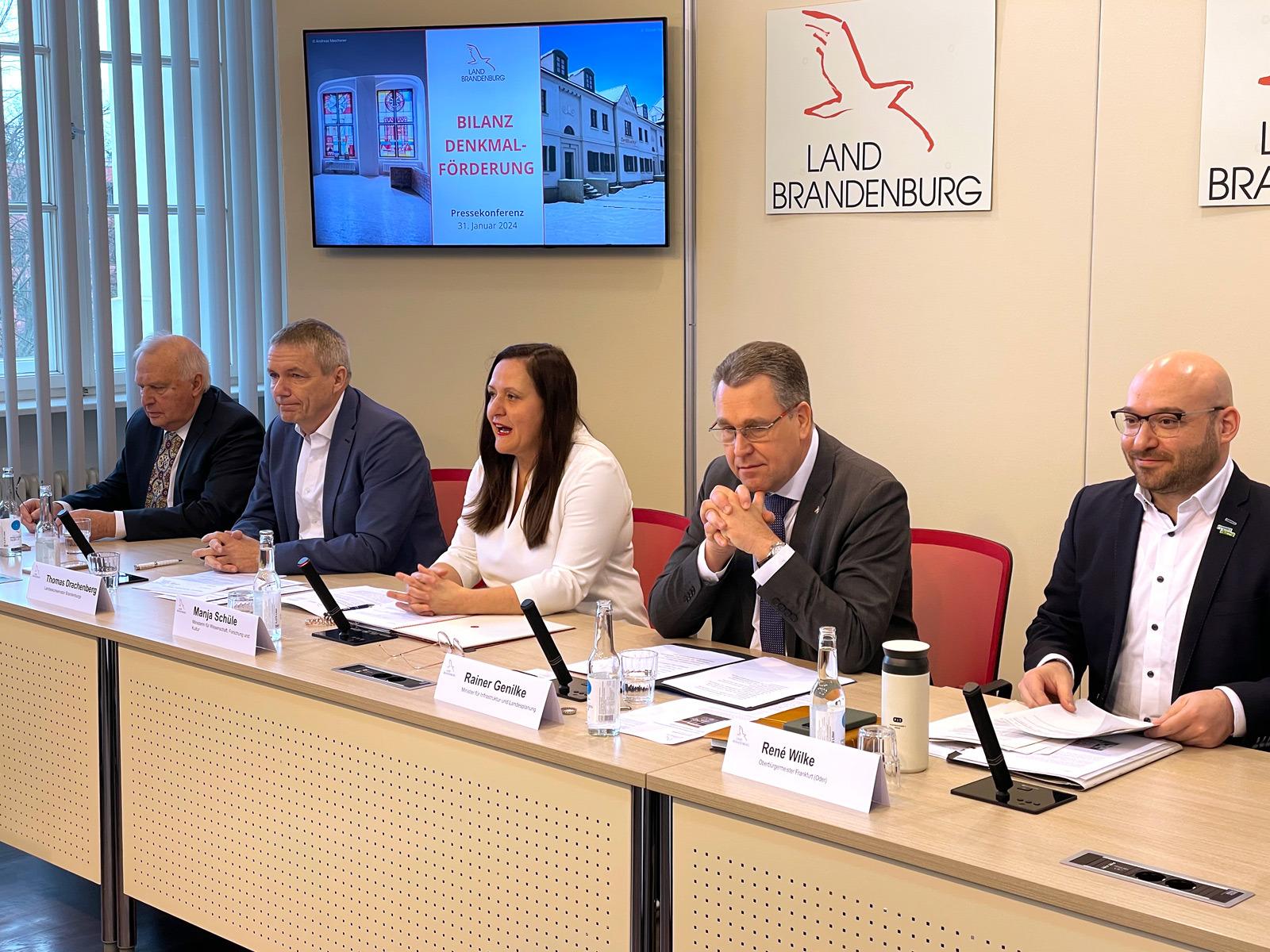
Minister of Culture Dr. Manja Schüle and Minister of Infrastructure Rainer Genilke, together with State Conservator Prof. Dr. Thomas Drachenberg, presented the results of the 2023 funding for monuments in the state of Brandenburg in Potsdam today. Siegfried Sonntag, Managing Director of Glauer Hof – Inklusion leben gGmbH, presented the renovation project for the Glauer Hof in Weißenberg (Teltow-Fläming district), which was renovated with funds from the monument aid program, among others. René Wilke, Lord Mayor of the city of Frankfurt (Oder), reported on the conversion and refurbishment of the town hall in keeping with its listed status. Last year, a total of around 46 million euros was invested in the protection, refurbishment and restoration of monuments using funds from the Ministry of Culture and the Ministry of Infrastructure. A similarly high sum is available this year.
An outstanding example of funding is the conversion and refurbishment of the historic town hall of the city of Frankfurt (Oder) in line with its status as a listed building. Supported by the urban redevelopment program, it is the largest and financially most extensive single urban development project in the state of Brandenburg. Since the start of construction in 2019, the estimated total construction costs have increased from around 25 million euros to currently around 36.8 million euros. To date, 18 million euros in urban redevelopment funding has been approved by the federal and state governments.
Frankfurt City Hall is one of the oldest buildings in the city. It consists of two parts, the historic town hall from the 13th/14th century and a three-winged extension around an inner courtyard, which was completed in 1913. The magnificent south gable of the medieval part of the building was built in the second half of the 14th century. Between 1607 and 1610, the building was rebuilt, including the addition of the northern town hall tower in the Renaissance style. In 1953, the town hall, which had been destroyed at the end of the Second World War, was rebuilt. In 1978, the new 20th century building was functionally redesigned, modernized and structurally repaired. The renovation was awarded the GDR Architecture Prize in 1978. Since then, no more extensive renovation work has been carried out.
Before the renovation began, the main part of the town hall was in a state of disrepair and no longer met today's structural standards. The renovation work included the refurbishment of all areas in line with listed building requirements, the reconstruction of the historic roof structure, the renewal of the building services, the fire protection upgrading of the entire building, barrier-free accessibility in the building and at the entrances as well as the construction of a new independent waste collection building next to the town hall. Demolition measures and the removal of harmful substances were carried out, the steel structure for the roof truss was replaced in accordance with the historical cubature and the roof truss was completely renewed. Window and façade refurbishment and the interior work have already been largely completed. Completion of the town hall renovation is scheduled for early summer 2024.
Mayor René Wilke: "After completion of the renovation work, which was significantly supported by the Ministry of Infrastructure and Regional Planning, and the move back in, we have the opportunity to revitalize the town hall as a place that goes beyond the function of an administrative headquarters. The visualization of the historical origins interlocks with modern architecture and the needs of a lively urban society. The result is a meeting place for the people of Frankfurt, where proximity to the citizens and exchange are intended to create a sense of togetherness - in short: a feeling of identification. This also includes preserving the town hall's architectural history. On the one hand, the refurbishment of the building in line with its listed status was associated with numerous expected and unexpected challenges. On the other hand, it is a valuable asset when looking at the final result and has a lasting impact on the character of our town hall."
Around 14,000 architectural monuments are recorded in the state's list of monuments. Of more than 40,000 archaeological sites, around 11,000 are registered as demarcated ground monuments.
In Brandenburg, the 18 lower monument protection authorities of the districts and independent cities as well as the Prussian Palaces and Gardens Foundation Berlin-Brandenburg are responsible for monument protection issues. The state's monument authority is the Brandenburg State Office for Monument Preservation and Archaeological State Museum, based in Wünsdorf (Teltow-Fläming).
